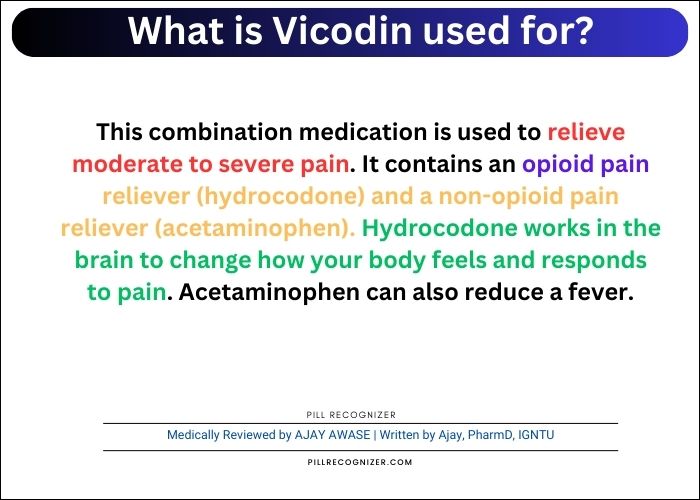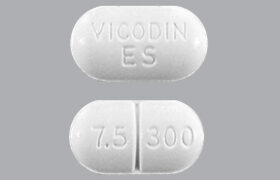“Vicodin: 7 Essential Uses, 5 Hidden Side Effects, and 4 Critical Risks You Need to Know”
Medically Reviewed by AJAY AWASE | Written by Ajay, PharmD, IGNTU
“Vicodin: 7 Essential Uses, 5 Hidden Side Effects, and 4 Critical Risks You Need to Know”
Here’s a table format for the information you provided, with colors for clarity:
Vicodin 500 mg/5 mg is the name of the white, oval pill bearing the imprint VICODIN. It is provided by Abbott Scientific.
Vicodin is a member of the narcotic analgesic combination medication class and is used to treat back pain. Pregnancy cannot be considered risk-free. The Controlled Substance Act (CSA) lists Vicodin 500 mg/5 mg as a Schedule 2 controlled substance.
| Attribute | Details |
|---|---|
| Availability | Prescription-only |
| Drug Class | Narcotic analgesic combinations |
| Pregnancy Category | C – Risk cannot be ruled out |
| CSA Schedule | 2 – High potential for abuse |
| Labeler / Supplier | Abbott Laboratories |
| National Drug Code (NDC) | 00074-1949 (Discontinued) |
Vicodin: Uses, Side Effects, and Risks
Table of Contents
- “Vicodin: 7 Essential Uses, 5 Hidden Side Effects, and 4 Critical Risks You Need to Know”
- Vicodin: Uses, Side Effects, and Risks

1. Introduction to Vicodin
Acetaminophen and hydrocodone are two potent chemicals combined in the pharmaceutical drug Vicodin. This narcotic analgesic is a preferred treatment for ailments like post-surgical pain, accident recuperation, and chronic pain management because it is generally utilized to ease moderate to severe pain.
Common Uses in Pain Management
Vicodin is frequently prescribed to patients for a variety of pain conditions, such as back, dental, and post-operative pain. Because of how well it relieves pain, it is frequently recommended; nonetheless, there are important things to keep in mind.
2. How Vicodin Works
Mechanism of Action
Vicodin acts by interfering with the pain receptors in the brain. A semi-synthetic opioid called hydrocodone attaches to these receptors to lessen pain perception. Acetaminophen can help reduce temperature and improve pain-relieving effects.
Drug Composition
Typically, each Vicodin tablet has 300 mg of acetaminophen and 5 mg of hydrocodone. Effective pain management is made possible by the combination, which may lessen the need for greater dosages of opioids alone.
3. Approved Uses of Vicodin
Indications for Prescription
Vicodin is prescribed by doctors to treat pain that non-narcotic painkillers are unable to control. Because of its potential for addiction, it’s critical that patients utilize it under close medical supervision.
Types of Pain Treated
Vicodin is often utilized for:
- Post-operative pain
- Injury-related pain
- Chronic conditions such as arthritis
4. Dosage Information
Recommended Dosages
Although the first dosage varies according to each person’s needs, it is usually one pill every four to six hours as needed for pain. It is imperative to adhere to the recommended dosage in order to prevent major health hazards.
Guidelines for Use
Patients should take Vicodin exactly as prescribed. Skipping doses or taking extra can lead to complications, including dependency and overdose.
5. Potential Side Effects
Common Side Effects
While Vicodin can be effective, it may cause side effects such as:
- Dizziness
- Drowsiness
- Nausea
Serious Risks to Be Aware Of
Severe allergic reactions, acetaminophen-induced liver damage, and respiratory depression are examples of more serious adverse effects. It’s critical that you get medical help right away if you encounter any strange symptoms.
6. Risks and Warnings
Abuse and Addiction Potential
Vicodin is classified as a Schedule II controlled substance due to its high potential for abuse. Misuse can lead to physical dependence, addiction, and overdose.
Pregnancy and Breastfeeding Considerations
Vicodin falls under Pregnancy Category C, indicating that risks cannot be ruled out. Pregnant or breastfeeding individuals should consult their healthcare provider to discuss the potential risks to the baby.
7. Interactions with Other Medications
Drugs That May Interfere
Medications such as sedatives, antidepressants, and other opioids may interact with Vicodin. To prevent potentially hazardous interactions, always let your healthcare professional know about all of the medications you use.
Alcohol and Substance Interactions
Alcohol should be avoided while taking Vicodin, as it can exacerbate side effects and increase the risk of liver damage.
8. Alternatives to Vicodin
Non-Narcotic Pain Relievers
For some patients, non-narcotic options like ibuprofen or naproxen may provide adequate relief without the risks associated with opioids.
Physical Therapy and Other Options
In addition to medication, physical therapy, acupuncture, and mindfulness practices can be effective pain management strategies.
9. Conclusion
Vicodin can be a valuable tool for managing pain, but it must be used responsibly under medical supervision. Understanding its benefits and risks is essential for safe usage.
Importance of Medical Supervision
Always follow your healthcare provider’s instructions, and communicate openly about your pain management needs and any concerns regarding side effects.
10. Frequently Asked Questions
Common Inquiries About Vicodin
Q: Can I take Vicodin for a long time?
A: Dependency may develop with extended use. It’s crucial to visit your healthcare provider on a regular basis.
Q: What should I do if I miss a dose?
A: As soon as you recall, take it; however, if the following dose is practically due, omit it. Don’t ever double up.
Patient Experiences and Advice
Vicodin helps a lot of patients feel better, but it’s important to know the hazards. Others who have experienced pain management firsthand can benefit from sharing their experiences.
Vicodin (Hydrocodone-Acetaminophen) FAQ
Common Questions and Answers
General Information
- What is Vicodin?
- A. Acetaminophen, a non-opioid painkiller, and hydrocodone, an opioid painkiller, are combined in the prescription drug Vicodin.
- What is the typical dosage of Vicodin?
- A. Vicodin dose is determined by your unique needs as well as the intensity of your discomfort. Your doctor will figure out how much is right for you.
Uses of Vicodin
- What is Vicodin used for?
- A. Vicodin is used to treat moderate to severe pain. It is often prescribed for:
- Postoperative pain
- Trauma-related pain
- Cancer pain
- Can Vicodin be used for other purposes?
- A. Vicodin is not intended for other uses.
Side Effects of Vicodin
- What are the common side effects of Vicodin?
- Common side effects of Vicodin include:
- Constipation
- Nausea and vomiting
- Drowsiness
- Headache
- Dizziness
- Dry mouth
- Sweating
- Constipation
- What are the serious side effects of Vicodin?
- Serious side effects of Vicodin can include:
- Addiction
- Overdose
- Liver damage
- Respiratory depression
- Allergic reactions
Precautions
- Who should not take Vicodin?
- A. Vicodin shouldn’t be taken by anyone with a history of substance misuse, respiratory depression, severe liver or kidney issues, or any of these conditions.
- Can Vicodin be taken during pregnancy or breastfeeding?
- A. Vicodin can damage a developing foetus and enter breast milk. In the event that you are pregnant or nursing, speak with your doctor before using Vicodin.
- Does Vicodin interact with other medications?
- A. Other drugs, such as sedatives, antidepressants, and other opioids, may interact with Vicodin. Tell your doctor everything you take in terms of medications.
Addiction and Abuse
- Is Vicodin addictive?
- A. Yes, Vicodin is addictive. It is important to take it exactly as prescribed and avoid misuse.
- What are the signs of Vicodin addiction?
- Signs of Vicodin addiction may include:
- Taking more than prescribed
- Using it more often than prescribed
- Experiencing withdrawal symptoms when you try to stop using it
Remember: This information should not be used in place of expert medical advice; rather, it is intended mainly for general reference. See your healthcare professional if you have any questions or concerns regarding Vicodin.
END

